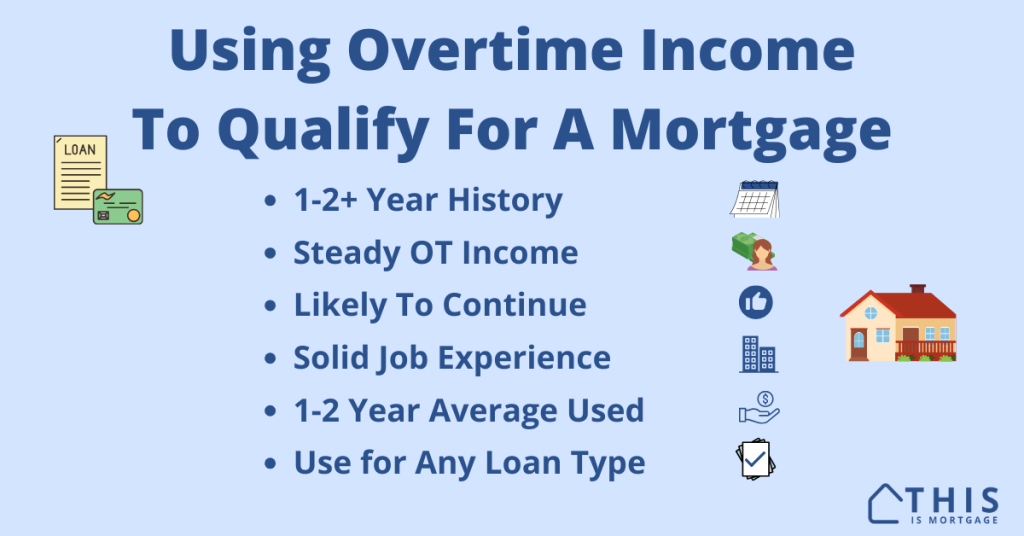If you earn overtime income consistently, it may help you qualify for a mortgage.
Here are guidelines for FHA, plus how other loan programs view OT income.
See if your overtime income qualifies you for a mortgage.
- FHA rules for overtime income
- How the lender calculates overtime income
- Calculation of base salary versus overtime
- Overtime history less than 2 years: FHA, conventional, USDA, VA
- Can you count future overtime?
- Changing jobs: can you use OT from the new job?
- Documentation
- Things that could jeopardize your ability to use OT
- Overtime earner? You may qualify to buy a home.
FHA rules for overtime income
The key ingredient FHA lenders need to use overtime pay is history.
Luckily, FHA is more lenient than most programs. It only requires one year of overtime income if it’s likely to continue.
However, two years of history is better and will help the lender make a more solid case that you will keep earning this income type.
Request your income review here.
How the lender calculates overtime income
For FHA, the lender will use one of the following:
- Your average overtime from the last two calendar years
- If less than 2 years, the full amount of time OT has been received
- Your most recent 12-month average, if lower than either of the two options above
For example, you earned $20,000 in overtime two years ago, but $10,000 last year. The lender will use $10,000, or $833 per month as your overtime income.
Note that the lender will use dollar amounts earned. It will not calculate the number of OT hours and form a future income calculation based on a new rate of pay.
The lender will also review your year-to-date overtime to ensure it aligns with your average. Following are various examples. Income used by the lender is →bolded.
| Steady OT | Declining OT | Low year-to-date | |
| Two years ago | →$20,000 | $20,000 | $20,000 |
| Last year | →$22,000 | →$10,000 | $22,000 |
| Year-to-date (June) | $11,000 | $6,000 | →$6,000 |
| Calculation | $20k + $22k / 24 months | $10k / 12 months | $6k / 6 months |
| Qualifying Income | $1,750/mo | $833/mo | $1,000/mo |
While lenders mainly focus on the last two calendar years, your year-to-date matters. A low YTD number could make your two-year average irrelevant. The lender will typically use the worst-case scenario when calculating variable income like OT.
Calculation of base salary versus overtime
The lender does not use a 24-month average of your base salary as it does for OT. Rather, it uses your current base then adds averaged OT to it.
For example, you earn $5,000 per month in base salary, up from $4,500 per month last year. Your 24-month OT average is $1,500 per month. Qualifying income is $6,500 per month ($5,000 + $1,500).
Overtime history less than 2 years: FHA, conventional, USDA, VA
In general, all major loan types review overtime similarly. However, there are some differences when it comes to OT history less than two years.
All major loan types except VA allow you to use overtime income to qualify with at least 12 months of history.
To take advantage of this exception, you need compensating factors such as:
- Strong history in the same industry
- You have a large down payment, great credit, and/or financial reserves after closing
- Your overtime income isn’t a majority of your pay
- Reasonable debt-to-income ratio
Specifically, here’s what each program looks for.
FHA: Overtime must be received for at least one year with no exceptions. Additionally, it must appear likely to continue.
Check your FHA loan eligibility.
Conventional: Minimum one year required, and the “borrower’s employment profile demonstrates that there are positive factors to reasonably offset the shorter income history.”
USDA: One year in the same line of work is required. Overtime that fluctuates 20% higher or lower from the previous 12 months will be analyzed further. For USDA eligibility, all household income including OT expected for the next 12 months will be reviewed. Note that, in some cases, your OT can be counted “against” you for income limits, but not be added to qualifying income for approval purposes.
VA: Two years of history are required. Overtime received at least 12 months but less than 24 may only be used to offset closed-end debts that are scheduled to be paid off within two years.
Keep in mind that underwriters have to make judgment calls. One lender might let you use OT to qualify when another doesn’t.
Get a second opinion from another lender if you’ve been denied because the lender couldn’t use OT to qualify. Many lenders impose “overlays” which are stricter rules than what the agency itself requires. Find a lender with no overlays.
Apply with a lender with no overlays here.
Can you count future overtime?
If you’ve been working under a standard salary structure but just switched to a job where you expect overtime, you can’t use it to qualify.
Some jobs offer almost guaranteed overtime. Even with a solid letter from your employer stating that OT is pretty much standard, you can’t use it until you have 12 months of history.
If you’ve made overtime, but expect it to increase, the lender can still only use your historical average.
Changing jobs: can you use OT from the new job?
If you came from a job where you had one to two years of OT history, then you could potentially use expected OT from the new job to qualify.
The lender may need to see a few months of paystubs and a letter from your employer stating OT is expected to continue.
More conservative lenders may want to see 12 months of OT at the new job before letting you use it to qualify.
Documentation
To prove overtime income, the lender will collect:
- Your year-to-date pay stub
- W2s for the last 2 years
- A breakout of base and OT from either
- Your year-end pay stub for the last two calendar years
- A verification of employment completed by your employer
- HR contact information
Because W2s and 1099s don’t break out overtime from base, the lender will need year-end pay stubs or a salary verification from your employer. These documents break out salary, bonus, overtime, and commission. Some companies rely on third-party services like The Work Number or an internal HR department for these verifications.
Your HR department can tell you how they usually perform verifications of employment.
See if you qualify for FHA or another loan type.
Things that could jeopardize your ability to use OT
The following are red flags for the lender when it comes to OT income.
Job changes in the previous 12 months: Job roles and expectations can change dramatically. Expect to supply a strong letter from your employer about expected overtime work if you recently changed companies or roles within a company.
Job gaps: Some lenders will disregard previous OT pay with job gaps longer than 30 days. Because you need a 12-month history at a minimum, the clock may reset if you were without a job for a time.
Declining OT: If the overtime portion of your income declined in the most recent calendar year or year-to-date, expect to compose a solid letter of explanation. The lender will probably use the most recent calendar year amount for qualifying purposes.
Uncertain OT continuance: Even with 2 years of history, a lender can still disregard OT income if it appears unlikely to continue. For example, a police officer received tons of overtime for two years, but the department website states it is facing budget cuts and is now limiting OT. The underwriter will go looking for things like this as part of your approval process.
Overtime earner? You may qualify to buy a home.
Overtime analysis is complex. Before making an offer on a home, get a fully underwritten pre-approval from a lender.
At the very least, you’ll know where you stand and what to work on to get mortgage-qualified.




